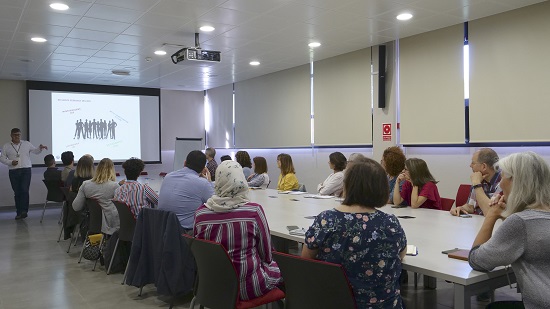
The CSIC research institute and the FPCUV organize a scientific-technological networking to promote the transfer of knowledge within the park.
Thirty professionals from the Institute of Agrochemistry and Food Technology (IATA-CSIC) and the companies located in the Science Park have shared their current lines of work in a scientific-technological networking in search of possible collaborations through joint research projects, provision of services, patent exploitation licenses or even personnel exchange.
José Manuel Guillamón, Deputy Scientific Director of IATA, stressed that "in the last three years we have signed more than 200 contracts with companies". He also noted that the institute "has more than 40 priority patents with more than 50% transferred to companies.
In this line, the manager of the FPCUV, Fernando Mª Zárraga explained that biotechnology is one of the main areas of activity of the Science Park. "Two out of every 10 companies installed in the Science Park develop products and/or services for Biotechnology and Medicine and Health. 15 of them make up the main nucleus of the BIOregion of the Valencian Community (Bioval). They generate more than 250 qualified jobs".
On the part of IATA, the working groups were presented:
- Meat Biochemistry and Meat Products, the group works and develops techniques related to Enzymology and the identification and characterization of peptides and proteins from the different animal species used in the food industry. This includes chromatography techniques, immunochemistry, gel electrophoresis, isoelectrofocus in liquid medium, enzymatic reactions, as well as mass spectrometry techniques applied to Proteomics, Peptidomics and Metabolomics.
- Microbial Ecology, Nutrition and Health, focused on the analysis of the influence of the human microbiota and its genome (microbiome) on the nutritional and health status and on the development of metabolic and immunological pathologies, and selection and evaluation of the efficacy and mechanisms of action of new probiotic bacteria.
- Packaging, this group works on the development and improvement of new materials, mixtures, structures and coatings for packaging that better resist food activity and reduce environmental impact. Characterization of the functional properties of packaging materials with special attention to problems of pack/food interaction. Study, development and design of new packaging technologies including MAP packaging and active and intelligent packaging systems.
- Microbiological safety of food: detection of pathogens, conservation processes and risk assessment, this group focuses its activity on the establishment of food conservation processes (thermal and non-thermal) and on the development of new foods, as well as on the detection, identification and rapid quantification of pathogens in food (viruses and bacteria) by means of PCR and mass sequencing techniques (MSG), with the aim of contributing to food safety through the application of microbiological risk assessments.
- Physiology, Pathology and Post-harvest Biotechnology, dedicates its activity to the study of the quality of the fruit and its maintenance during post-harvest conservation. This activity is developed with multidisciplinary approaches focused on the knowledge of the physiological and molecular mechanisms related to the quality of fruits during post-harvest, as well as the development of conservation methodologies to avoid or reduce post-harvest losses caused by physiological and pathological alterations of the fruits.
- Bioactive proteins and peptides of agrifood interest, the general objective of the group's research is the identification, rational design and production of small peptides and proteins with beneficial properties for health and antimicrobial activities, as well as the detailed characterization of their mechanism of action. For this we use microbiological, biochemical, biotechnological, genetic-molecular, cell biology and functional genomics methodologies.
Biopolis, Lifesequencing, Darwin Bioprospecting Excellence, Dawaco, Q'omer Bioingredients, TAU Analytics and ValGenetics came from the business area of the Science Park. "I hope that this type of scientific-technological networking will be repeated year after year. These initiatives encourage science to be closer to our society every day", highlighted María R. Albiach, CEO of ValGenetics.
Among the technical services that IATA offered to PCUV companies, we can highlight its pilot plant, sensory analysis, cell culture development, microscopy, analysis and genomics, proteomics and phenomena.
Translated with www.DeepL.com/Translator

